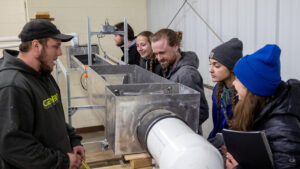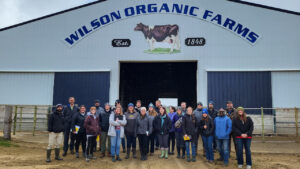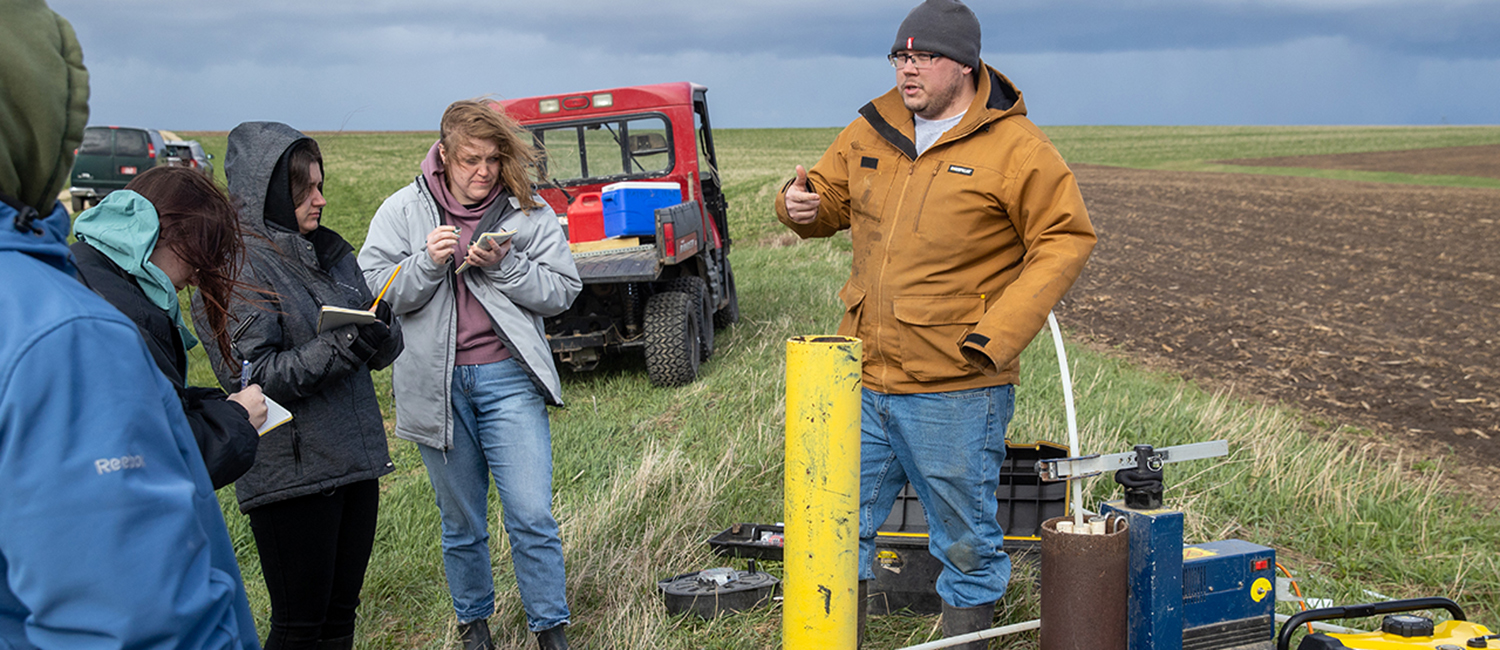Written by Alison Parkins, UW-Platteville
The University of Wisconsin-Platteville recently hosted students from across the state for the second Wisconsin Agriculture-Water Nexus Network field trip, funded by the Freshwater Collaborative of Wisconsin, where students explored critical issues related to the connections between agriculture and water management.
The three-day field trip course was developed last year by faculty from UW-Platteville, UW-Madison, UW-Green Bay and UW-Stevens Point. The host of the field trip rotates to leverage the regional geographic variations of each participating school.
“The main goal of the trip is to expose students to different regions of the state and how the farmers and researchers are addressing water quality issues there,” said Dr. Joseph Sanford, assistant professor in the School of Agriculture and organizer of the recent trip. “Southwest Wisconsin presents some pretty unique issues. The landscape of agriculture production is much different.”

Some of the challenges, unique to Southwest Wisconsin, Sanford explained include the topography of the Driftless region, which leads to more runoff in the fields. The soil in the region is siltier, making it more highly erodible than the sandy soil of Central Wisconsin. The popularity of trout fishing in the region poses additional challenges because of the close proximity of streams to agricultural land.
“The majority of the trip was spent talking about efforts that researchers and producers are putting into trying to reduce impact, mainly focused on surface water,” said Sanford. “The main goal was to get students in the field seeing these issues. As professors, we hear from people at the DNR, UW-Extension or NRCS, that water quality is a huge issue – related to agriculture – and when our students come out of programs focused on water quality or environmental science, they know the issues, but they don’t always know the production side. They have to be able to step on a farm and talk to the producer, and that’s a different game. So, we want to expose them to water quality issues but also expose them to different types of agriculture and different types of producers.”
The three-day field trip included visits to small and large farming operations, including the Cates Family Farm in Spring Green, Wisconsin, and the Wilson Organic Farm in Cuba City, Wisconsin, where they learned about their regenerative grazing practices and other ways they are committed to conservation on their land. Students learned about cover crops, tillage practices and other land-water management methods through meetings with the NRCS, the Lafayette Ag Stewardship Alliance and Yahara Pride Farms and visits to UW-Platteville’s Pioneer Farm, the Lancaster Agriculture Research Station and the USDA Dairy Forage Site, among others.

“Before this trip, I had no experience with agriculture production but a little experience with water quality issues,” said Emma Ball, a senior from Elburn, Illinois, majoring in environmental engineering. “I wanted to participate in this experience, because water quality problems in varying settings and land uses interested me. I wanted to see how serious water quality impacts were taken in the agriculture realm and in southwestern Wisconsin.”
Ball was one of 16 students who participated; six students from UW-Platteville were joined by students from UW-River Falls, UW-Stevens Point and UW-Green Bay. Students represented a range of programs, from soil and crop science, reclamation, environment and conservation, and environmental engineering.
Jeffrey Smolinski, a soil and crop science major, joined the trip in order to gain more context around concepts he learned in class.
“I worked with Dr. Sanford in an internship before and have had many classes based on water quality or agricultural production, so I have plenty of background information on those topics,” said Smolinski, a junior from New London, Wisconsin. “What made me desire going on the trip was to put that book knowledge into real-life observations of operations and do on-site tours. Revisiting what you know through various approaches significantly helps learning and recollection, and this trip did exactly that.”
Sanford said plans are underway to continue offering the field trip at least once a year, in different regions of the state, and the long-term goal is to encourage students to participate again and expand their knowledge beyond Southwest Wisconsin.
“Students in Platteville aren’t necessarily going to stay in Platteville, just like students in Green Bay aren’t necessarily going to stay there,” he said. “Being exposed to these different areas is really going to broaden students’ opinions, in the long-term, about how systems are managed. The overall goal of the group is to try to expose students to the different ways farmers manage their farms and the different ways that farmers – along with researchers, extension agents and whoever else is on the ground – are helping to address these water quality issues.”
It’s that coordination and collaboration among everyone working to solve these issues that Maggie Foster, a junior reclamation, environment and conservation major, said was her biggest takeaway from the trip.
“In the field, we see farmers working with agronomists, working with lab scientists, working with conservationists, etc.,” said Foster. “The list goes on. Soils and plants run on very complex systems, so it makes sense that there would be extensive systems in place to manage them, so that was very fun to witness firsthand.”
The Wisconsin Agriculture-Water Nexus Network – established with funding from the Freshwater Collaborative of Wisconsin – is a network of water researchers from University of Wisconsin institutions across the state, tasked with developing educational courses on agriculture-water management. For more information about WAW2N, visit freshwaterdev.wisconsin.edu/ag-water-network/.

